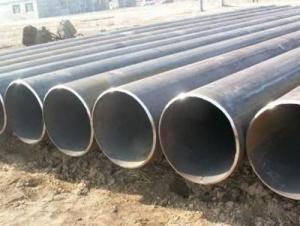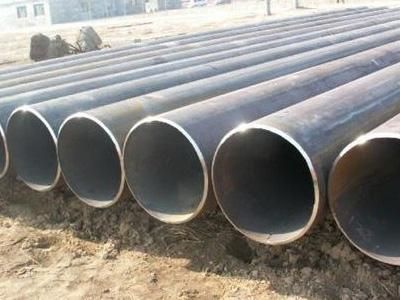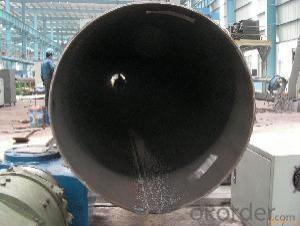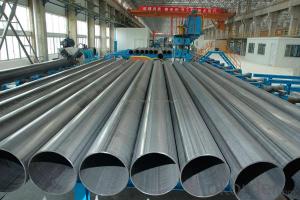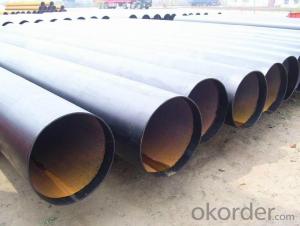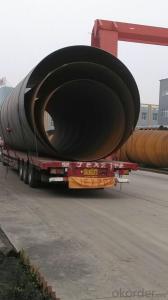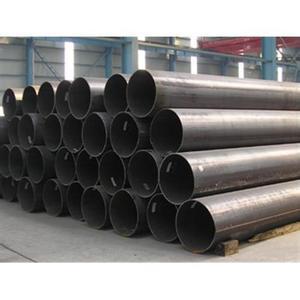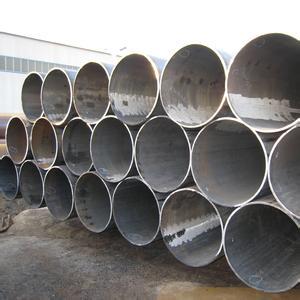36'' CARBON STEEL LSAW WELDED PIPE API/ASTM/JIS/DIN
- Loading Port:
- Tianjin
- Payment Terms:
- TT OR LC
- Min Order Qty:
- 5 m.t
- Supply Capability:
- 300 m.t/month
OKorder Service Pledge
OKorder Financial Service
You Might Also Like
Packaging & Delivery
Packaging Detail: | standard export packing or as customer's requirement |
Delivery Detail: | within 10 - 30 days |
Specifications
Spiral Welded Steel Pipes and Tubes
1.Material:Q195-Q235
2.Length:1-12m
3.WT:1.0-14mm
4.O.D.:20-273mm
Product Description:
1.Material : Q235,Q345,L245,L290,L360,L415,L450,L485,GrB,X42,46,X52,X56,X60,X65,X70,X80,X100
2,Standard: SY/T5037-2000,GB/T9711-2011,API Spec 5L PSL1/PSL2,ASTM A252\A53,ISO3183,DIN17172,EN10217,JIS G3457,AWWA C200,ASTM A139,ASTM A671,ASTM A672
3.Wall thickness: 3.0mm-30mm
4.Outer diameter: φ168mm-3020mm
5,Length: 5m-12m or as your requirement
6,Corrosion protection standard: DIN30670,DIN30671, AWWAC210, AWWA C203, SY/T0413-2002,SY/T0414-2002
7,Application: Oil, gas, natural gas, water pipe, thermal electricity pipe, steel structure engineering, etc
Q195-q345 Material Steel Pipe's Materials
Elements | Chemical Compsition% | Mechanical Property | ||||||
C% | Mn% | S% | P% | Si% | Yield Point (Mpa) | Tensile Strength(Mpa) | Elongation | |
Q195 | 0.06-0.12 | 0.25-0.50 | <0.050< span=""> | <0.045< span=""> | <0.030< span=""> | >195 | 315-430 | 32-33 |
Q215 | 0.09-0.15 | 0.25-0.55 | <0.05< span=""> | <0.045< span=""> | <0.030< span=""> | >215 | 335-450 | 26-31 |
Q235 | 0.12-0.20 | 0.30-0.70 | <0.045< span=""> | <0.045< span=""> | <0.030< span=""> | >235 | 375-500 | 24-26 |
Q345 | <0.20< span=""> | 1.0-1.6 | <0.040< span=""> | <0.040< span=""> | <0.55< span=""> | >345 | 470-630 | 21-22 |
Packaging & Delivery
Packaging Detail: | Normal exporting packing,in container or bulk vessel or as per clients' request |
Delivery Detail: | 2 months after confimed contract |
Specifications
Large Diameter API 5L X70 PSL2 LSAW Steel Pipe
Grade: X42, X46, X50, X52, X60, B, C
OD: 1.5"-28"
WT: SCH10-SCH160
Brand:TPCO
Large Diameter API 5L X70 PSL2 LSAW Steel Pipe
Specifications:
u Standard: API 5L
u Grade: B, C, X42, X46, X50, X52, X56, X60, X65, X70, X80
u OD: 1.5"-28"
u WT: SCH10-SCH160
u Length: 5-12m
u Ends Finish: plain end, bevel end, grooved end
u Surface Treatment: bare, black varnished, oiled finish, red color, anti-corrosion, 3PE, FBE or epoxy coating
u Technique: hot rolled or cold drawn
u Application: api 5l steel pipe for conveying oil, water, gas
u Invoicing: based on theoretical weight or actual weight
u Payment Terms: L/C at sight, T/T or Western Union
u Trade Terms: FOB, CFR, CIF
u Certification: ABS manufacturing assessment, ABS design assessment, API 5CT, API 5L, DNV manufacturer certificate, ISO9001 quality management system certificate, ISO14001 environment management system certificate, GB/T28001 occupational health and safety management system certificate, A1 class manufacturing license of special equipment certificate, CCS, GL, LR, SGS, TüV, PDE
- Q: How are steel pipes threaded for connection?
- Steel pipes are threaded for connection using a threading machine or a die. The pipe is clamped securely into the machine, and a rotating die is then used to cut threads into the pipe's surface. This process creates the necessary grooves and ridges that allow the pipes to be securely connected together.
- Q: What are the common applications of steel pipes in the oil and gas industry?
- Steel pipes are commonly used in the oil and gas industry for various applications such as drilling, production, transportation, and distribution of oil and gas. They are utilized for casing and tubing in oil wells, conveying fluids in pipelines, and supporting infrastructure for refineries and processing plants. Additionally, steel pipes are crucial for offshore drilling operations and are employed in the construction of platforms and subsea pipelines.
- Q: What is the difference between steel pipe and tubing?
- The main difference between steel pipe and tubing lies in their shape and size. Steel pipe is typically cylindrical in shape and has a larger diameter compared to tubing, which is generally produced in a variety of shapes, including round, square, and rectangular, with smaller diameters. Additionally, steel pipe is commonly used for transporting fluids and gases, while tubing is often utilized for structural applications or as components in mechanical systems.
- Q: What are the different types of coatings applied to steel pipes?
- There are several types of coatings that can be applied to steel pipes, including epoxy, polyethylene, fusion bonded epoxy (FBE), and zinc coatings. These coatings provide protection against corrosion, abrasion, and chemical damage, ensuring the longevity and durability of the steel pipes in various applications.
- Q: How are steel tubes represented?
- Galvanized pipe: InchSeamless steel tube, welded pipe, nonferrous metal pipe, etc.: outer diameter x wall thickness
- Q: Can steel pipes be used for wastewater treatment plants?
- Yes, steel pipes can be used for wastewater treatment plants. Steel pipes are commonly used in wastewater treatment plants due to their durability, strength, and resistance to corrosion. They are able to withstand the harsh conditions and chemicals present in wastewater treatment processes, making them a suitable choice for transporting and distributing wastewater within the plant.
- Q: Can steel pipes be used for underground fire protection systems?
- Yes, steel pipes can be used for underground fire protection systems. Steel pipes are commonly used in these systems due to their durability, strength, and resistance to fire. They can effectively withstand high temperatures and provide reliable and long-lasting protection against fire hazards in underground environments.
- Q: What quota is reserved for buried DN20 steel pipe?
- If it is reserved for embedded pipe pre buried steel waterproof casing, set of waterproof casing steel production and installation is to set the quota items, if the outdoor installation of welded steel pipe buried steel casing pre quota items, if it is a reserved hole, then there is no need to set the quota items.
- Q: Are steel pipes environmentally friendly?
- Steel pipes can be considered environmentally friendly for several reasons. Firstly, steel is a highly durable and long-lasting material, which means that steel pipes have a longer lifespan compared to other materials like plastic pipes. This reduces the need for frequent replacements and repairs, reducing waste and conserving resources. Secondly, steel is a highly recyclable material. At the end of their lifespan, steel pipes can be easily and efficiently recycled, without losing their properties or quality. This reduces the demand for new steel production, which often requires significant amounts of energy and resources. Furthermore, steel pipes have a high resistance to corrosion, which means that they require fewer chemical treatments to prevent rusting and maintain their structural integrity. This reduces the release of harmful chemicals into the environment and minimizes the impact on ecosystems and human health. It is also worth mentioning that steel pipes are used in various industries, including water supply and wastewater management. Steel pipes are known for their excellent strength and reliability, ensuring the safe and efficient transportation of fluids. This reduces the risk of leaks and spills, preventing contamination of water sources and protecting the environment. However, it is important to note that the production of steel pipes does have some environmental impact. The extraction of raw materials, such as iron ore and coal, requires energy and can contribute to deforestation, habitat destruction, and greenhouse gas emissions. Additionally, the manufacturing process itself generates emissions and waste. Overall, while steel pipes may not be completely free from environmental impact, their durability, recyclability, and resistance to corrosion make them a relatively environmentally friendly choice compared to other materials.
- Q: How are steel pipes protected against fire?
- Steel pipes are protected against fire through various methods such as applying intumescent coatings, using fire-resistant insulation, or encasing them in fire-rated enclosures. These measures help to delay the heat transfer and maintain the structural integrity of the pipes during a fire, allowing them to withstand high temperatures and prevent the spread of fire.
Send your message to us
36'' CARBON STEEL LSAW WELDED PIPE API/ASTM/JIS/DIN
- Loading Port:
- Tianjin
- Payment Terms:
- TT OR LC
- Min Order Qty:
- 5 m.t
- Supply Capability:
- 300 m.t/month
OKorder Service Pledge
OKorder Financial Service
Similar products
Hot products
Hot Searches
Related keywords
